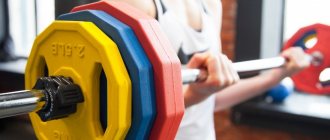Our ability, desire and opportunity to engage in fitness, as well as the effectiveness of these activities, are influenced by many circumstances, ranging from lifestyle, time of day, strength of character, psychotype, biorhythms, habits to profession.
Therefore, it is not possible to unambiguously determine a common period of time for everyone for the most comfortable and effective training.
Each period has its own pros and cons. Something different will suit each individual.
When is the best time to train to get the best results?
“I don’t have time” is the main excuse people come up with when asked why they don’t exercise.
Tony Schwartz's book "The Power of Full Engagement" says that it is not the timing of exercise that matters, but our energy distribution. If people monitored their energy levels and their lives gave them positive energy, they would be able to get more done in a day.
One of the sources of such positive energy in our lives is sport.
Sports exercises give us energy and increase our activity. We will notice the effects of yesterday's workouts, even if we are working in the office today.
The fruits of training appear immediately after its completion. It becomes easier for a person to concentrate on work, he is more attentive and cheerful. Compared to someone who avoids the gym, an athlete is in a better mood, more creative, and more social.
For those looking to start working out, we encourage you to explore the pros and cons of working out at different times of the day to make it easier for them to find a time that fits their lifestyle and schedule.
To understand why time of day affects training, we need to look at how our bodies function throughout the day. Our biological clock regulates sleep, eating patterns, blood pressure and body temperature. This rhythm can be important in sports and in many other areas of our lives.
Is there a best time to train?
The results of a study published in the Journal of Strength and Conditioning Research in 2009 will help you understand this. They studied whether men's muscle growth differed if they exercised only in the morning or only in the evening.
The subjects were divided into 2 groups:
One group trained from 7 to 9 a.m., and the other from 5 to 7 p.m.
This was a direct comparison between morning and evening training.
At the end of the 10-week study, the researchers measured the size of the quadriceps muscles of all participants and recorded a significant increase in both groups.
However, in the morning group there was an increase in quadriceps by 2.7%, and in the evening by 3.5%.
In their conclusion, the researchers noted that the 0.8% increase was not statistically significant..
In other words, the results in both groups were so similar that they can be considered the same. But the point is that there was a slight advantage in the evening group. It's hard to say what might have happened if the study had included more people or lasted longer than 10 weeks.
But in truth, there is another study published in the journal Applied Physiology, Nutrition, and Metabolism in 2020, the results of which are quite interesting.
It involved 42 men who trained either in the evening or in the morning for 24 weeks. Their workouts included a combination of strength and endurance exercises.
In this study, the evening group had significantly greater muscle gain from weeks 13 to 24 compared to the morning group.
What are the benefits of training in the evening?
When is the best time to exercise: glycogen and amino acids
Why did the morning group's muscle growth slower in the previous study than the evening group's?
It is likely that some participants who trained in the morning did so while hungry.
It's no secret that fasted workouts are great for burning fat while cutting the body, but there are some problems with gaining muscle. During physical activity on an empty stomach, muscle breakdown is significantly accelerated. This will most likely not be noticeable for a short period of time (as in the first study). But after a few months, the lag in muscle growth will become obvious if you train hungry all the time.
Returning to the aforementioned study, even those subjects who ate breakfast before training had much less energy in their bodies than the evening group. In any case, glycogen levels in the liver and muscles will be higher in those who train in the evening.
And the amount of glycogen in your muscles significantly affects your energy levels during exercise (if you don't have enough of it, you won't be able to train hard enough). And there are some studies that show that low glycogen levels significantly inhibit protein synthesis.
In a nutshell, those who train in the evening will always have higher glycogen levels because they have the whole day to boost them through carbohydrate consumption.
And if you have more fuel in your muscles, this will lead to more muscle gain.
Now let's look at all this from the point of view of proteins.
If you exercise in the evening, after several meals throughout the day, you will naturally have higher levels of protein and amino acids in your blood.
It is important to emphasize: most researchers agree that the amount of protein consumed throughout the day is of primary importance for muscle growth. It is necessary to consume a sufficient amount of protein (about 2 grams per 1 kg of body weight per day) and no matter how many times and when.
However, most experienced athletes are convinced that higher levels of protein and amino acids in the body during and after training have a positive effect on muscle growth.
Again, within 2 to 6 weeks, you won't notice any difference, but it will certainly lead to more progress in the longer term. Does this mean that the best time to workout is in the evening?
In principle - no!
Just food for thought.
When is the best time to exercise: strength and body temperature
Another important factor is the difference in fitness between the morning and evening groups.
This means that in the morning we are usually weaker than in the evening. At least in theory (in practice this is not always the case). In people with a normal daily routine (awake during the day, sleeping at night), reaction speed, alertness and mental alertness are higher, and the feeling of fatigue is lower in the afternoon.
After you've slept all night, your body temperature and energy levels drop slightly. And higher body temperature is associated with better performance.
After all, this is the main reason we warm up before a workout: to warm up our muscles. Increased blood flow to muscle fibers helps us perform better. But again, it would be foolish to think that absolutely everyone is more energetic at the end of the day. There are many other reasons (including psychological ones) why some people feel a surge of energy in the morning.
A 2010 study showed that sprinters' peak energy output was much higher in the afternoon than in the morning. It is quite possible that this rule also applies to strength training in the gym. And since you are stronger in the afternoon, you can therefore lift more weight. And if you can lift more and train more intensely, this will lead to additional muscle growth over time. Again, you probably won't notice a difference for 4 weeks. The benefits of evening workouts will become noticeable after a few months.
For clarity, here is another 1998 study conducted by the US National Library of Medicine National Institutes of Health, which studied the dependence of strength on training time in 10 healthy, untrained men. They were asked to do strength exercises at 8 a.m., noon, 4 p.m., and 8 p.m. The researchers noted that the highest levels were at 8 p.m.
There are other studies that have come to similar conclusions. But here's the thing: that doesn't mean everyone gets stronger in the afternoon. Much depends on the person himself (biorhythms, mood, sleep and rest patterns).
And there is no doubt that there are many people who prefer morning workouts, and they feel that it increases their energy levels for the entire day ahead. Plus, our body can adapt to the times we exercise.
In other words, if you consistently hit the gym only in the morning, pretty soon your body will get used to it and your strength and energy levels won't be an issue.
But there are other factors that are important to know.
When is the best time to exercise: hormones
As we have already found out, during evening training the athlete’s body contains much more glycogen and amino acids, higher body temperature and strength indicators.
What role do hormones play in all this? Interesting fact: overall testosterone levels tend to be lowest in the evening.
But there's one caveat: Scientists have found that although testosterone levels decrease in the evening, evening workouts cause a much greater release of testosterone than morning workouts. And if you consider that most people also experience the lowest levels of cortisol in the evening, then training in the evening looks more promising.
There is such a thing as the testosterone/cortisol ratio . In principle, the higher this ratio, the more pronounced the state of anabolism in the body and the better the muscles grow. And a low ratio (which indicates high cortisol and low testosterone) results in a loose, so-called “skinny fat” appearance . This most often happens to those who do too much cardio combined with strict diets. These people are not obese, but their body fat percentage is quite high due to insufficient muscle mass.
In 2013, scientists from Slovakia conducted an interesting study that showed that anabolic signaling in the human body is higher during training late in the evening.
Natural anabolic steroids in the body are hormones such as:
- Testosterone.
- A growth hormone.
- Insulin-like growth factor - IGF-1.
The operating principle of this system is quite complex.
Plus, there are mechanisms that increase its effectiveness. One of the activators is an enzyme known as mTOR (from the English mammalian target of rapamycin). The more you activate mTOR, the higher the anabolic signal, the more active protein synthesis in the muscles. According to this study, published in the Journal of Sports Sciences, this entire system is most active in the afternoon. But there are other ways to activate anabolic signaling. For example, a high-protein diet. Therefore, high protein diets lead to better muscle growth.
The same applies to carbohydrates. One of the fastest ways to increase testosterone levels is to increase your carbohydrate intake.
Thus, it turns out that evening training is more effective for gaining muscle mass.
It is important to note: many experiments reveal patterns that cannot be called a cause-and-effect relationship.
It's difficult to say anything for sure.
During the evening hours, the ratio of testosterone to cortisol is most favorable, and therefore SCIENTISTS BELIEVES that this time is most suitable for muscle growth. However, this is certainly not enough to say that training in the evening is more effective.
In fact, it has now been proven that additional muscle growth does not occur unless the increase in testosterone goes well beyond the normal range of 8.0 - 28.1 nmol/L (500-1000 ng/dL).
This usually only happens if you are taking testosterone boosters or anabolic steroids.
So, although research shows that the testosterone/cortisol ratio is most favorable in the evening hours, it would be an exaggeration to say that this difference will lead to significant muscle growth.
However, this is another fact that is useful to know.
Is morning training better?
Let's say right away that in the morning you can study more often and more consistently - no one bothers you, there is nothing to do yet, and you can leave the rest of the day for something else. The early bird gets the worm, right? But this theory doesn't always work, so the best time to exercise is whatever works best for you personally.
Research into the relationship between exercise time and type of exercise has shown that athletes select exercises that fit best into their routine. Thus, people who trained in the morning chose sports such as cycling or running because they were easier to do in the morning.
If you're thinking of breaking up your workday and studying during lunch, be careful. It is noticed that only 26 percent of participants come to class during lunch. At the same time, 70 percent of those who train after work came to the trainer on time.
Many people just want to do all the exercises in the morning and be done with it for the day. If you think so, then read on to see other benefits of a morning workout.
The benefits of a morning workout
Perhaps the morning is the best time to work out in the gym for a number of reasons:
- The rest of the day is free
Exercising is an enjoyable part of the day for many people, but exercise takes a lot of time, so it is often done first. But if you were able to complete the workout in the morning, then the rest of the day is yours. That's why so many people prefer to exercise in the morning.
Another reason for practicing in the morning is to avoid feeling remorse. You know that training is important and needs to be done. Otherwise, you will be haunted all day by a feeling of unfulfilled duty. The longer you put off exercising, the stronger the guilt.
Many people are familiar with the feeling of freedom that appears after training. It is for this reason that the author of this article is in a hurry to deal with it as early as possible.
- There are fewer people in the gym in the morning and more free equipment
This is the most enjoyable aspect of working out in the morning - you don't have to compete to get hold of the machine or equipment.
It has been noticed that only older people get up early in the morning. The rest prefer to sleep longer. Therefore, you will notice that the gym will be almost empty in the morning. Then you won't have to stand in line near the exercise machine or share the floor with other athletes.
The gym will be packed by 9 o'clock, so it's better to train at 8. In addition, the gym will be in order, all the equipment will be in its place, and it will be easier for you to find what you need. The bench press will most likely not be occupied.
- You'll have more energy after your workout
After you drag yourself to the gym early in the morning, you'll emerge with high energy levels. Not only will you be more energetic, you will actually have more energy. Training works even better than coffee in this sense.
After a fitness routine, you will notice improved focus and creativity, allowing you to get more done in a day and finish routine work earlier.
- You will become more focused
Those who value the regimen will definitely notice more benefits from the workout. And people who get up early in the morning often turn out to be more responsible than those who put it off until the evening.
This happens because when the day begins, a person has unexpected changes in his schedule: unplanned meetings that can push the workout into the evening, or even cut it out of your routine, family matters. If you want to exercise daily, you need to do it in the morning - then it's harder for you to stop.
Cons of working out in the morning
- In the morning you are a zombie
For many, it's difficult to get out of the comfort of bed in the morning, let alone travel to the gym and workout itself. In the morning, such people are irritable, silent and simply unhappy. Therefore, you should get enough sleep and go to bed earlier.
To avoid becoming a zombie, sleep 7-8 hours a day.
- Get ready in the evening
Your workout can be done in the morning, but you need to prepare for it in advance in the evening. Someone who likes to do things at the last minute and is a poor planner will not be able to get to the gym on time.
To avoid any inconsistencies in the morning, put everything you need in your backpack in the evening. To have a successful morning, go to bed early to get a good night's sleep.
How to make waking up more pleasant
First, you should make a solemn promise to yourself that you will definitely keep. You should not decide whether you will go to training in the morning or not.
Make up your mind and steadfastly direct all your strength to fulfill this promise.
Once you develop a good habit like this, you will be able to complete the workout even if the conditions are not in your favor. Even if you couldn’t get ready or went to bed late and became a lethargic zombie in the morning. Just keep at it until exercise becomes an integral part of your life.
Eventually, your body will respond to your lifestyle and automatically wake you up at the right time.
You can simply ask yourself the question - what will make training easier for you?
Maybe you could lay out your workout clothes the night before to make it easier to get dressed in the morning? Maybe you can cook breakfast in the evening? Or maybe set an alarm clock on the other side of the room so you have to get up?
Find all the little things to make the climb easier and more enjoyable.
What is the best time to exercise?
The human body obeys circadian rhythms. By nature, our body is programmed to be active at specific times and rest at specific times. Moreover, these periods may differ for different people: some feel a surge of energy in the early morning, while others experience maximum productivity in the afternoon. Therefore, there is no exact recipe for when it is best to exercise. Training will be most effective if it coincides with a person’s individual rhythms.
During activity, two important parameters for a person fluctuate:
- Physical activity in which the muscles can perceive the load positively or not very well.
- Psychological activity in which the brain can actively perceive everything new or resist receiving any stimuli.
It is important to choose the time for training taking into account your biorhythms. Observe how you feel for 2-3 weeks to identify when you usually become drowsy, apathetic, or irritable. Training at this time will not be very useful: even if you force yourself to go to work out, your body will only get very tired.
And vice versa, if you notice that you have a strong desire to move and be active, try to schedule sports at just such a time. Training at the peak of activity, in which the muscles will enjoy the work, will contribute to the active burning of fat and the acquisition of beautiful muscle mass.
To track such periods of your well-being, you can keep a special diary.
By determining daily biorhythms, you can correctly distribute active activity and rest. During periods of activity, plan sports and other activities , including mental ones, for periods of its decline - daytime sleep, meditation or just relaxation.
In accordance with biorhythms, people are conventionally divided into “night owls” and “larks”:
- Larks are people who get up easily in the morning and are most active in the first half of the day, but find it difficult to stay awake at night.
- For owls, everything is different: they have an extremely difficult time getting up in the morning, feel tired and apathetic, but in the afternoon their performance improves.
- There is also a third type called the pigeon. People who use it can work equally effectively both in the morning and in the evening, without feeling a lack of energy.
Thus, the best time to exercise will be determined by biorhythms. It is better for larks to train in the first half of the day, for owls - in the second. Then the training will take place with maximum benefit and pleasure.
It also happens that a person’s rhythm gets lost. This may be affected by factors such as working in shifts, moving and flying, time changes, having small children, pregnancy, and so on.
But in the course of certain studies it was revealed that the rhythms can be changed. For example, if a person starts exercising regularly in the morning, over time his body will get used to it and be ready for it. Experts insist that adjusting the biological rhythm is especially important for athletes who are preparing for certain competitions. They advise rescheduling training for the time of day at which the upcoming competition is scheduled.
Workout before breakfast
Exercising on an empty stomach has physiological differences from exercising after eating. In the morning before breakfast, our body is ready to use fat as an energy source, so by exercising on an empty stomach, you will burn more fat.
Burning fat during exercise may have metabolic benefits, but will it actually provide a benefit? No, he won't. The researchers divided the subjects into two groups - one exercised before breakfast, and the other after. And although all participants lost weight, the results of the two groups were no different.
The dependence of appetite and food consumption on the timing of exercise was also studied. Those who exercised in the morning ate less in the afternoon, thereby consuming less food per day. This allowed them to lose more pounds than the evening group.
But some researchers have also noticed that people are able to work more efficiently in the evening. This way, we expend more energy, which will allow us to burn more fat than if we exercised in the morning.
Biological rhythms
There is a direct relationship between physical activity and biological rhythms. The more time a person spends in movement, the better his well-being: he feels a surge of strength, vigor and a desire to work appear. Evening training leads to the fact that it is not possible to rest normally at night, and the condition becomes worse in the morning.
It is best to exercise not before bed, but in the morning, when the desire to exercise appears involuntarily. After such physical activity, the body receives enough energy for the whole day.
Food deserves special attention. Training should be done half an hour after eating. It is also possible to perform exercises on an empty stomach, but not strength exercises. Thanks to this, you will be able to burn calories and get rid of excess weight.
Even with a great desire to lead a healthy lifestyle, not everyone has the opportunity to do exercises in the morning. In this case, physical exercise can be postponed to the evening.
The main thing is that the workout is completed at least three hours before going to bed. This is due to the fact that the muscles cannot immediately relax, and the body continues to be in an excited state for a long time.
Pros of evening classes
- Your body is in better condition
When you exercise in the afternoon or evening, you don't have to warm up because your temperature is already at its peak. It rises throughout the day.
Increased temperature makes joints more flexible, increases overall muscle strength and improves endurance.
In the afternoon and evening, a combination of low blood pressure and slow heart rate develops. Due to this, reaction time is accelerated, training results are improved and the likelihood of injury is reduced.
At the same time, it has been noted that in the evening there is a maximum level of testosterone in the blood, which is useful for strength exercises.
- Easier to find a coach or partner
If you need a trainer or partner to help you with your exercises, it will be easier to find one during the day. You can also always come to him on time, because in the morning you may not get enough sleep or find another reason not to come.
- You have more options for classes and group activities
If you prefer indoor exercise classes (such as yoga), you'll find more options in the afternoon or evening. Plus, your favorite trainer may be teaching two or more classes a day, so you'll have a better chance of catching a class during the day or evening.
- Working out relieves stress after a long day
One of the best reasons to exercise in the afternoon is the calm and freedom that exercise gives you after a hard day at work. This is especially true for those who face stress and long hours of routine at work. This hour you spend in the gym is completely dedicated to your stress relief. You can free your mind while taking care of your health at the same time.
Features of training for night owls
What time to exercise? After noon. In the morning his body will be completely unprepared for stress. In addition, if a person’s hormonal levels “sway” slowly, activity in the morning can even provoke a strong deterioration in well-being.
The first training session may take place over a period of 12-16 hours. Usually this is a lunch break, which can be replaced by a gym or aerobics.
It is better to schedule strength training after work. In the evening, the owl, unlike the lark, is full of energy and can exercise with benefit and pleasure. After training, it is recommended to have a protein-rich dinner.
Evening workouts also have their benefits. The working day is already over, you can take your time and give your best, besides, the muscles and ligaments are already sufficiently warmed up, which minimizes the risk of injury. After training, you can fully relax, and your body will recover overnight.
Thus, at what time it is more effective to exercise, everyone can choose individually, depending on their biorhythms. But remember that in any case, regularity, consistency and a sense of proportion are very important.
Minuses
- You can forget about regularity
Postponing your workouts until the evening means you may miss your workout due to unexpected random events. You may also feel tired during the day, your day may be stressful, or you may have to stay at work longer than expected. All this can be a reason to completely cancel the workout.
Working out in the evening or during the day becomes all the more difficult if you have to plan for the next day. After a long day, you want to relax and unwind, rather than go to the gym.
- Expect the gym to be packed.
If you go to the gym after work, expect there to be a lot of other athletes who are also done with work and have decided to exercise too. There will be queues, and shells will be in great demand.
- We'll have to prepare
If you exercise after work, you will have to watch your food intake. Pack extra snacks so you don't get hungry while exercising.
This also means that you will carry a backpack with sportswear, food containers and other necessities.
The best time for strength training and mass training
Evening is the ideal time for strength training. You can familiarize yourself with mass training in our article Mass training program. However, you should provide dinner 1.5-2 hours before training, so as not to burden your body with a heavy meal before going to bed.
It should also be remembered that there are many other equally important components of successful training. The most important of them are:
- regularity of training
- good and healthy nutrition
- rest
- desire and faith in the result
If you have the opportunity to engage in the type of physical activity that is most suitable for this at the recommended time, then this is great: you will naturally help your body quickly achieve the desired result. If you don’t have such an opportunity, then don’t be upset, your body will choose the best time for training itself, the main thing is to listen to it well and help it find this time.
And in conclusion, a summary video on this issue from the leaders of fitness and bodybuilding in Russia.
Exercise and sleep
Exercise raises body temperature and makes a person more alert, which turns out to be completely opposite to the opinion of many who believe that it helps to get tired and fall asleep.
However, more and more people believe that it is still possible to exercise before bed.
Swedish researchers found that exercising an hour and a half before bedtime can help a person fall asleep faster, wake up less often during the night, and get better quality sleep.
Scientists also say that some athletes do not sleep enough to wake up earlier for morning training. It is not right. If you're going to get up at 5am to go to the gym, then go to bed early. Sleep is no less necessary than the workout itself.
When is the best time to exercise to lose weight?
If you want to lose weight, become more athletic, or just get healthier, but don't know when is the best time to exercise to lose weight, then this information is for you.
We all know that we need to exercise regularly. Therefore, you need to find time for training - you must, firstly, learn to wisely create a schedule for the day.
For many people, the morning will be the right time, while for some people they will only be able to squeeze in a workout in the evening. And both options have their pros and cons, as we wrote about above.
But is there really a “best” time to exercise for weight loss?
About weight loss
Losing or gaining weight depends entirely on energy balance. Regardless of the intensity of your exercise, if you consume more calories than you burn, you will gain weight.
But reach a calorie deficit —burn more than you eat in a day—and you trigger various hormonal and enzyme reactions that cause fat to be broken down into fuel.
And this way you will burn excess fat.
How to burn more calories
Your body burns energy in four ways:
- Primary functions - they are also called basic metabolism. The body uses this energy simply for survival: heartbeat, breathing, brain function and maintaining the life of muscle cells.
- Physical activity without exercise is all daily movement that is not considered a sport. Walking and working on a computer also require energy.
- Exercise – All exercise performed requires energy expenditure.
- Digestion – A small amount of energy goes into digesting the food you eat.
So, if you add up all these amounts and you end up with more calories than you eat, then you will use up a certain amount of calories as fat from your fat stores (cells).
It is clear that you can directly influence only two factors - physical activity and sports.
Your body is constantly working and adapting
Although many people believe that the human body is a static machine that works without deviation, it actually works dynamically. The body constantly adapts to its environment using numerous built-in mechanisms. An example is your daily rhythm, which adapts to your routine.
The daily rhythm changes many parameters of your body:
- Sleep cycle – your body knows when to wake up and when to go to sleep.
- Hormone levels – testosterone, growth hormone, cortisol and melatonin are released at different times of the day.
- Body temperature is lower in the morning and higher in the evening.
Some studies suggest that metabolism also speeds up and slows down throughout the day. But does this mean that you burn different amounts of fat at different times of the day?
Important notes: To reduce the amount of fat in your body, you must create a calorie deficit and maintain it for a long time.
Your body has a built-in clock that controls how your body reacts to different stimuli.
Morning: “for”
Appetite decreases throughout the day Scientists from the UK compared data from surveys conducted among runners. It turned out that those who ran in the morning felt less hungry during the day than fans of evening jogging. Scientists have suggested that morning exercise suppresses the release of hormones responsible for appetite. This means that for those who tend to overeat, after a morning workout it will be easier to cope with the habit of chewing something all the time.
It is easier to burn fat in the morning. During physical activity, carbohydrates are first consumed and only after twenty minutes of movement do the muscles receive energy from fat. That is why long workouts, no shorter than 40 minutes, have always been recommended for weight loss. However, recent research from the American College of Sports Medicine shows that just 20-30 minutes of exercise in the first half of the day is enough. In terms of fat burning effect, this will be identical to 40 minutes after lunch. The reason is that until 17 o'clock in the afternoon our metabolism is set to consume energy, including fat. And after 17 hours the intensity of metabolic processes fades away, hormonal and other systems are already focused on replenishing reserves. Therefore, in the morning, stubborn fat deposits are more easily consumed.
Lower risk of injury After a morning workout, fatigue goes away faster and muscles recover better, says a new study from the University of Toronto. Doctors observed 3,000 people who were passionate about fitness and found that after morning training, the pulse returned to normal on average 20% faster than after evening training. In addition, a blood test showed that with the same intensity of training, microtrauma to muscle fibers and associated blood changes in the morning occur less frequently.
So, when is the best time to train for fat loss?
Let's be honest. For many busy people, working out at any time of the day can be challenging. A person spends a lot of time at work, but when he returns home, family and other things await him. It becomes almost impossible to go to the gym.
Some people think it's better to exercise in the morning
This is argued by the fact that fat burning is more easily activated in the morning.
But there is no strong evidence that it is easier to burn fat in the morning. This has only been studied twice, and the results were published in journals of dubious quality.
But those who say it's better to exercise in the morning also point out that your glycogen levels are lower in the morning, especially if you haven't eaten in a while. Since glycogen is low, the body will turn to fat as a source of energy.
But clinical trials have shown that training on an empty stomach is ineffective as a fat-burning mechanism.
But those who train in the evening have another problem - they find it difficult to fall asleep. Epinephrine levels in their blood are higher, making it difficult to relax for sleep. And quality sleep is important for weight loss, so working out in the evening may not be such a good strategy.
Thus, morning training has one advantage - it does not prevent you from falling asleep.
But working out in the evening can be a better investment of energy.
The study, published in the Journal of Sports Nutrition, suggests that people may have a harder time losing weight, even with exercise. This is due to the compensation effect.
When you exercise, your body consumes energy, but thinks you need to replace the lost energy. The hunger signal increases, causing a person to eat more.
Neil King, the author of this study, said that this is a strong vote in favor of evening exercise because, theoretically, the impulse to eat will be less. So, to lose weight, you need to exercise in the evening.
“A person who exercises in the afternoon or evening will go to bed earlier or rest in the evening.”
Thus, an evening workout helps burn fat, but not directly, but by weakening appetite and reducing overall food intake.
And if you go to bed earlier, you will allow your body to rest, recover and build muscle, thereby losing weight and fat. But only if you don’t “reward” yourself with high-calorie food after finishing your workout.
A little about Circadian rhythms
Generally speaking, circadian rhythms are the process of changes in the fluctuations in the intensity of biological processes, depending on the change of day and night. A number of studies prove that this is a powerful biological tool that regulates the phases of sleep, wakefulness, activity, energy, relaxation, etc. But, circadian rhythms are linked not to the time of day, but to light activity. Simply put, the light of the sun throughout the day. For example, if you place a person in an isolated bunker where no light rays penetrate, their waking and sleeping patterns will shift quite noticeably, but they will still be relatively the same over a 24-hour period (that is, without reference to daylight hours).
Therefore, the question of when is the best time to train, taking into account biological rhythms, is connected specifically with daylight hours and the usual way of life. Disruption of circadian rhythms can only have a negative impact if you quickly move to another time zone, which often happens after air travel.











